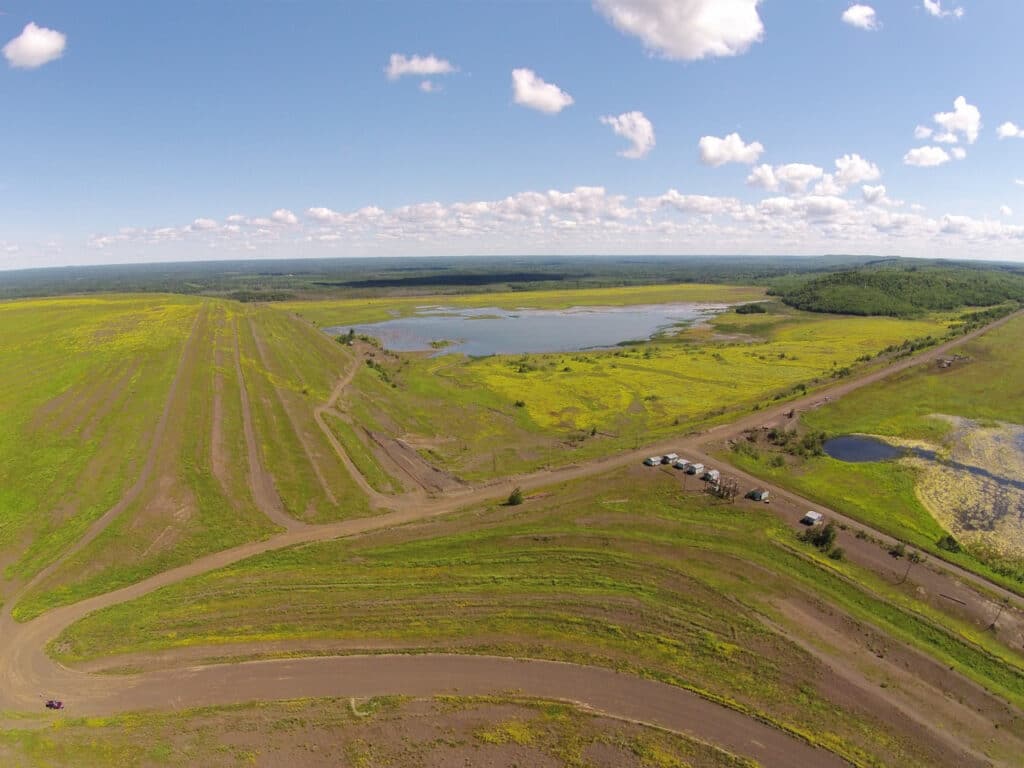
The merits of PolyMet Mining Corp.’s plan to seal its waste in clay to prevent pollution are being closely debated in a St. Paul courtroom this week. An administrative judge is overseeing the special “contested case hearing” ordered by the Minnesota Supreme Court two years ago. The court agreed with environmental groups who said the method for keeping oxygen and water from reaching the waste is unproven and untested.
While several permits for PolyMet’s proposal have been the subject of lawsuits, this hearing is restricted to the question of the bentonite clay the company proposes to use. This special substance swells when wet, and will be used to prevent water from moving through mine waste left over after processing. The tailings will contain sulfate that can react with air water to create acidic pollution that could contaminate lakes, rivers, and groundwater.
“During operations and reclamation, PolyMet proposes to add a bentonite layer to the Flotation Tailings Basin’s side slopes, pond bottom and beaches,” the DNR says. “The bentonite amendment is a layer of soil that will be ‘amended’ to incorporate a small percentage of bentonite, which will limit oxygen and water from reacting with the flotation tailings by creating a layer of saturated soil between the atmosphere and the flotation tailings.”
The environmental groups say, while bentonite is a major part of PolyMet’s plan to contain the site after mining is completed, neither it nor the Department of Natural Resources has provided any evidence to back it up.
“They contend that there is no evidence in the record that the bentonite amendment proposed by PolyMet has been tested nor is there any evidence that the methods for applying bentonite will be effective at reducing oxygen and water infiltration into the stored tailings,” the Supreme Court wrote in its opinion. “We agree.”
Examining evidence
Groups involved in the challenge include the Minnesota Center for Environmental Advocacy, Friends of the Boundary Waters Wilderness, WaterLegacy, and the Fond du Lac Band of Lake Superior Chippewa.
Previously, the Minnesota Court of Appeals had ordered a contested case hearing on numerous issues concerning the proposed copper-nickel mine, but the Supreme Court later decided it was only required to consider the bentonite issue. The court left open the possibility the DNR could decide to hold a contested case hearing on additional topics, but the agency has not yet agreed to do so.
“If the DNR continues to decline this opportunity, as it has since 2016, it will mean the first sulfide-mine proposal in Minnesota could advance without the DNR hearing from all sides on these major ongoing issues,” wrote Aaron Klemz, chief strategy officer of the Minnesota Center for Environmental Advocacy.
Contested case hearings are conducted much like a normal trial before an administrative law judge, with no jury. The proceeding includes introduction of evidence, testimony from witnesses and experts on all sides, and cross-examination. It will result in a recommendation from the judge for how the DNR should proceed.
The hearing began Monday and is expected to last through Friday. The DNR has also said it still needs to resolve two other issues with the permit: if the permit should include PolyMet owner Glencore, and establishing a fixed end date when water treatment will no longer be necessary.
More information:
- Hearing will focus on whether bentonite clay is effective in tailings dam – Duluth News Tribune
- PolyMet’s NorthMet Mining Project – Minnesota DNR
- Everything you need to know about the PolyMet contested case hearing – MN Center for Environmental Advocacy

